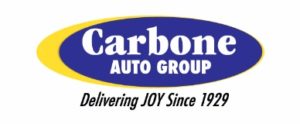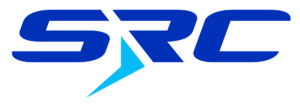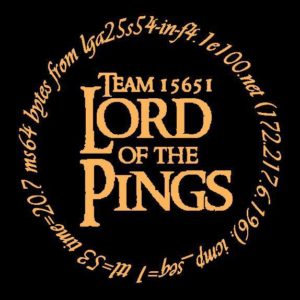SPONSORED BY FIRST SOURCE FEDERAL CREDIT UNION
Learning from recognized experts and professionals working in various technology fields, teams of students and their teachers add to their knowledge base and hone their skills during single- and multi-day camps.
To get involved or for more information, contact:
Maria Smith
Educational Programs Advisor
msmith@projectfibonacci.org
Drone Camps for Educators and Students
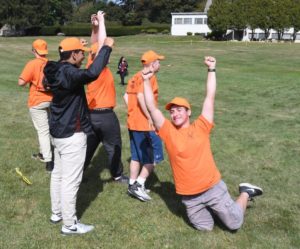
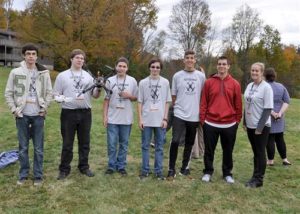
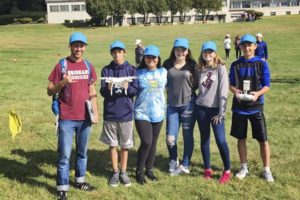
DRONE CAMPS
Drones, or unattended aerial systems/vehicles (UAS/V), have become increasingly important to the economic engine of upstate New York. With the NUAIR Alliance based at Griffiss International Airport in Rome, New York, one of seven UAS/V testing programs in the United States, and numerous research and development companies within the region, there is a regional focus on cutting-edge UAS/V technologies. The integration of drones into the National Air Space, the testing of automated package delivery for mega-companies such as Walmart and Amazon and the like are being addressed within what is called New York state Governor Cuomo’s “Drone Corridor”, spanning the 50-mile stretch from Rome to Syracuse, NY.
All of this points to the importance for today’s public schools to include the study of drones within their technology education programs for students.
And who better to learn from than those engaged in this work? At The Project Fibonacci® Foundation Drone Camps, teachers, public school students and college students learn from drone industry experts and Federal Aviation Administration (FAA) Certified Remote Pilots.
Drone Camp Goals:
- Introduce participants to various topics of interest to drone hobbyists
- Introduce participants to various drone technologies, training, and career options
- Provide educators with a knowledge base, technical expertise, and resources that enable further learning to take place at the school level within co-curricular or stand-alone curriculum, or as extra-curricular activities.
- Support understanding and appreciation of the local UAS/V industry and its role within the US economy
Hands-on learning opportunities are tied to the “new” (2017) New York State Science, Mathematics and Engineering Standards, and include an array of topics:
- Rules of the National Air Space
- Aerodynamics and how things fly
- Safe operations of quadcopters
- Flight simulation
- Manual flight
- Programming an autonomous flight path
- Semi-automated package delivery
- Small UAS/V components and repair
- sUAS photography/videography
- Drone racing and First Person View (FPV)
- “Sense and Avoid” technologies
- Why study drones? Local drone initiatives and training opportunities
In the News:
High Schoolers to Learn About Drones
Rome Sentinel Article: UAV Day
Student Interest Soars at Drone Days
Students get up-close look at unmanned air systems
Project Fibonacci Competition event set for next week
First Hand Experience with Unmanned Aerial Systems (video)
Past Drone Camp Events:
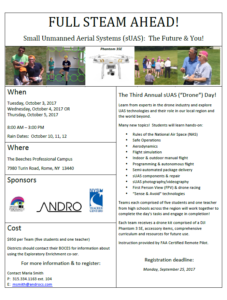
“Third Annual Full STEAM Ahead: sUAS/V, the Future, and You!”
October 2017
A quadcopter camp for high school teachers and their students
“Drones with Larry: An Introduction to sUAS/V Technology”
August 2017
A half-day drone camp for the high school and college participants of the 2017 Project Fibonacci Foundation STEAM Conference
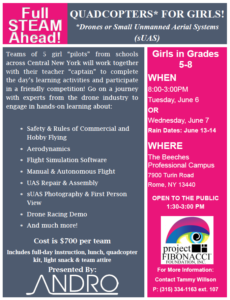
“Quadcopters for Girls”
May 2017
A drone camp designed specially to spark the interest of female students in grades 5-8 and their teachers
“Second Annual Full STEAM Ahead: sUAS/V, the Future, and You!”
October 2016
A quadcopter event for high school teachers and their students with a friendly competition
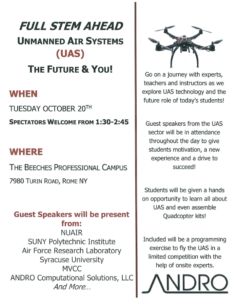
“Full STEM Ahead: sUAS/V, the Future, and You!”
October 2015
Pilot year drone camp offered to select high school teachers and their students (Rome Free Academy, Camden Sr. High School and Holland Patent High School)
JAVA CODING CAMPS
The Project Fibonacci® Foundation, Inc. is pleased to offer coding workshops using Java, one of the most popular programming languages used in the industry. Participants will have the opportunity to work with professional software engineers to develop code for an Android application that will control a real robot. These robots are used in FIRST® Tech Challenge tournaments in which teams consisting of students in 7th-12th grades can compete. Participants will also learn about agile software practices, debugging techniques, and source code management. These workshops will launch participants in becoming successful software developers.
What sets these workshops apart from other similar coding initiatives?
- In person instructor who is a professional engineer
- Real world testing with robots
- Use of industry standard robots
Workshops can be customized to fit your school’s needs! Our recommendation is for groups of eight students between 7th-12th grades, and 2-3 teachers/coaches as a maximum group size per workshop. It is best to host them on-site monthly at 2-4 hours per session, after school or on weekends. Workshops could run the length of the whole school year. At each workshop session new topics will be introduced while participants work at their own pace.
The Project Fibonacci® Foundation, Inc. has a robotics startup package including five robots: Four pre-built robots for continual programming and one competition robot
For additional information about Java Coding Camp, contact Andrew Burger at 315.334.1163 ext. 124 or aburger@projectfibonacci.org
For FIRST® Tech Challenge team formation information, contact: aburger@firstinspires.org
LORD OF THE PINGS- FTC TEAM 15651
Introducing the Project Fibonacci Foundations FIRST Robotics Team, Lord of the Pings.
The team consists of students from Rome, NY that meet weekly to design, build and create their robot for future FTC events. Follow Lord of the Pings on social media for team updates and more information
Special Thank You to the Lord of the Pings Sponsors
The Joseph and Inez E. Carbone Foundation & SRC, Inc.
